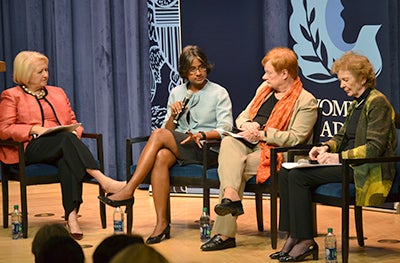Title: Women and Climate Change Symposium, Report Calls for Inclusion
U.N. Special Envoy for Climate Change Mary Robinson joins a panel at Georgetown to talk about the important role women need to play developing plans for global climate change solutions.

– Women must be a part of conversations developing plans for climate change if effective global solutions are to be found, U.N. Special Envoy for Climate Change Mary Robinson said at Georgetown today.
“We cannot achieve sustainable development if we do not meaningfully include half the population,” she said during a symposium on “Women and Climate Change,” sponsored by the Georgetown Institute for Women, Peace and Security (GIWPS).
The symposium took place in conjunction with a new GIWPS report called “Women and Climate Change: Impact and Agency in Human Rights, Security, and Economic Development.”
Women’s Agency
The report identifies key challenges posed by climate change, examines gender dimensions and proposes timely recommendations that seek to “enhance the efficacy of climate change policies and programs by introducing gender-sensitive reforms to the current agenda.”
“As the world takes action on climate change, there is a need, as the report demonstrates, to ensure that women are enabled to participate in the design and implementation of climate actions,” Robinson said.
A former president of Ireland, Robinson is now president of the Mary Robinson Foundation Climate Justice, a center designed to secure global justice for individuals vulnerable to the impacts of climate change.
Critical Juncture
Following her address, Robinson joined a panel discussion with Melanne Verveer, GIWPS executive director; Tarja Halonen, former president of Finland; and Radha Muthiah, CEO of the Global Alliance for Clean Cookstoves. Rachel Kyte, World Bank special envoy for climate change, delivered closing remarks.

Melanne Verveer, GIWPS executive director; Radha Muthiah, CEO of the Global Alliance for Clean Cookstoves; Tarja Halonen, former president of Finland; and Mary Robinson, U.N. special envoy for climate change discuss women’s roles in dealing with climate change.
“As the world confronts the borderless and multidimensional effects of climate change, it is imperative that we understand the impact of climate change on women, as well as the importance of their agency in addressing its threats,” said Verveer, who moderated the discussion and who previously served as the inaugural U.S. ambassador for global women’s issues.
“At this critical juncture,” she said, “we hope this report will fill a critical knowledge gap and demonstrate the need to include women’s voices, perspectives and participation at all levels of decision-making and all levels of adaptation and mitigation.”
Climate Change Conference
Verveer noted that the report and symposium are particularly timely, as the U.N. will convene a conference on climate change next month in Paris to negotiate a universal agreement on climate. The U.N.’s 21st session of the Conference of Parties (COP21) will follow with further conversations about climate change and sustainability.
“We already have the tools in place to combat climate change – now we have to use them,” said Halonen. “We have to get gender issues addressed at the COP21 Climate Conference in Paris.We have to change how the system works. It’s a historical shame if this [COP21] agreementdoes not address the gender dimension.”
Inclusive Development
The Millennium Development Goals, adopted by the U.N. in 2000 to eradicate extreme poverty, have been transformed into the post-2015 Sustainable Development Goals. The Sustainable Development Goals possess a global scope and place a stronger emphasis on sustainability as key to human progress.
“Women are the ones who are looking holistically at the needs of their families andcommunities,”Muthiah said. “They’re the ones who start to innovate and provide feedback. These kinds of innovations don’t come from the ivory towers, but come from the people who are facing the issues every day.”
Verveer added that GIWPS’s research underscores the need for cross-sector collaboration and the full participation of women at all levels.
“We have to push for the developmental empowerment of women, because that is the way that we will be resilient,”Kyte explained during closing remarks. “We can’t afford to not act now. The price of inaction is so much more than the price of action.”